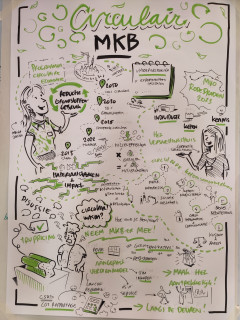Drawing by Govert van der Heijden from Flatland
The city of Amsterdam has ambitious circular goals, aiming to halve its resource usage by 2030. This corresponds to a yearly reduction in material use of the size of 15 Amsterdam Arenas. Collaboration amongst stakeholders, including small and medium-sized businesses (SMBs), is necessary to meet this target. In a work session, the focus was on engaging SMBs in the circular transition.
Ambitions and Strategy of the City of Amsterdam (Mariska Joustra):
The City of Amsterdam aims to reduce its use of new raw materials by 50% by 2023 and become fully circular by 2050. Using the Monitor Circular Economy, Amsterdam tracks its progress in the circular economy, enabling them to develop a strategy to achieve their ambitious objectives.
One of the key points of this strategy is to shift the focus from the city's organization to "Collaborating with the City" to better support entrepreneurs in the circular transition. Examples of how they try to achieve this are:
- Initiatives such as scaling up sustainable artificial turf fields through a significant procurement process.
- Using circular procurement as a means of encouraging companies to provide circular products.
- Mandating at least 20% of new construction to be timber-based.
- Offering a circular assessment to local manufacturers, allowing them to explore steps towards greater circularity.
“Rode Draden Raport” from the Versnellingshuis (Gabrielle Werkhoven):
The Versnellingshuis is an organisation that aids entrepreneurs in advancing circular business practices. Each year, they produce a Red Threads (Rode Draden) report that outlines the key issues in the circular economy. Their focus is on mobilizing the entire supply chain, which can be challenging. Process facilitators are vital for fostering circularity throughout the entire chain. Provinces like Noord-Holland and Zuid-Holland have lists of such facilitators to assist in making the entire chain more circular.
However, challenges persist, as the costs and benefits can vary significantly between different chain participants, making it difficult to implement systemic changes fairly.
Panel Discussion
Following the presentations, a discussion took place involving Jack Stuifbergen (MKB Nederland), Julius Heyning (Gekko), and Joanne Lucas (HvA), who represented the SMB sector. They highlighted the following key points regarding challenges and opportunities:
- Existing strategies, initiatives, and tools tend to benefit circular frontrunners within the SMB sector, often leaving the rest behind.
- Entrepreneurs often face legal obstacles in their sustainability efforts.
- Entrepreneurs need more financial incentives to transition to circular business models. The concept of "true price" could make a significant difference.
- Many entrepreneurs find it challenging to determine how to make their business more sustainable, particularly in sectors like software, where the environmental impact is not readily apparent.
- The Corporate Sustainability Reporting Directive (CSRD) offers significant opportunities for increasing circularity. It is crucial to ensure that SMBs are well-informed about the implications of this legislation.
Anne Schaap (MVO Nederland), Kornelis de Jong (municipality Haarlemmermeer), Gabrielle Werkhoven (Versnellingshuis), and Mariska Joustra (municipality of Amsterdam) discussed their efforts to support entrepreneurs:
- Simplifying the concept of circularity to emphasize resource savings and optimize logistics.
- Hosting events to educate SMBs about circularity, offering a platform for frontrunners in circularity.
- Collaborating with organisations like Triodos to assist entrepreneurs.
The consensus of the discussion was that more needs to be done to make circularity a pressing concern for the average SMB, their sense of urgency needs to be increased on this issue. More can be done for the front-runners as well because even though they receive considerable support, they still face legal and collaborative challenges.
This question was introduced in the Amsterdam Smart City network by Mariska Joustra from gemeente Amsterdam. The session was prepared with and moderated by Roos Kramer from Royal HaskoningDHV. Do you have any questions or input for us? Contact me via noor@amsterdamsmartcity.com or leave a comment below.



